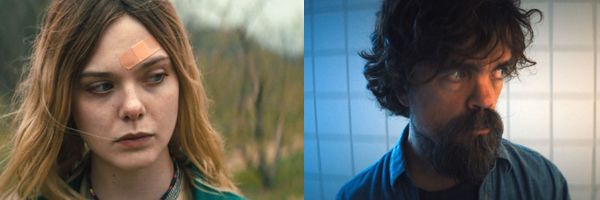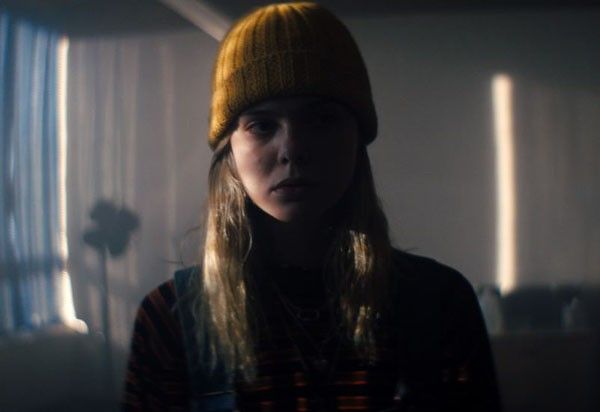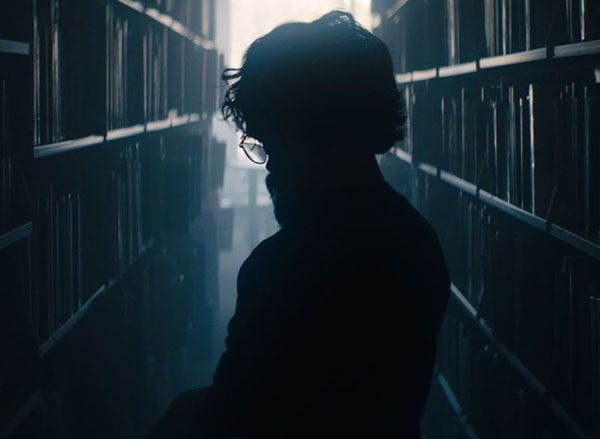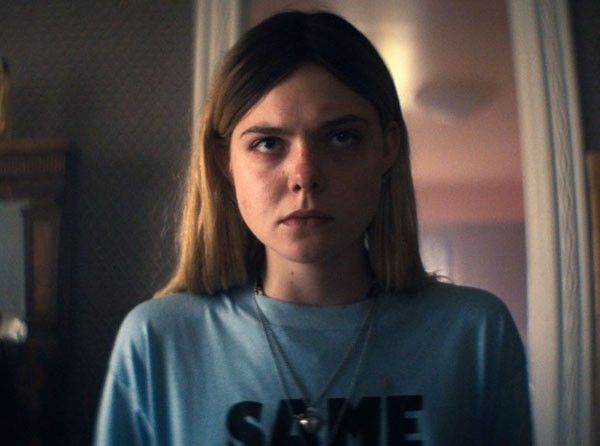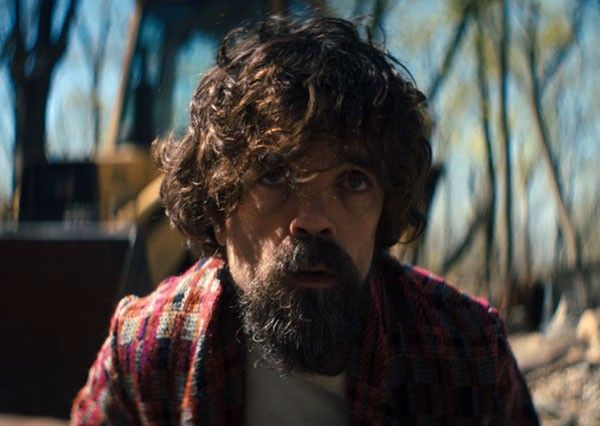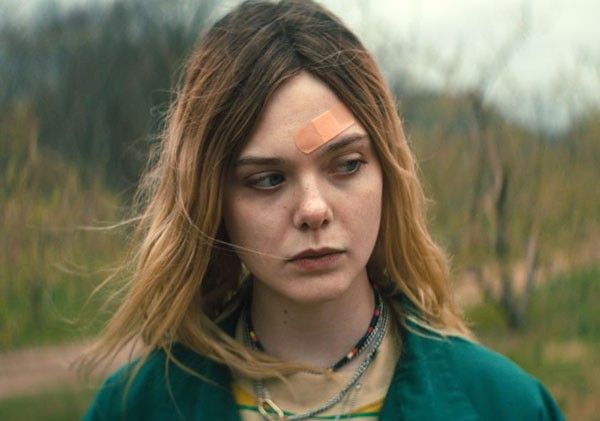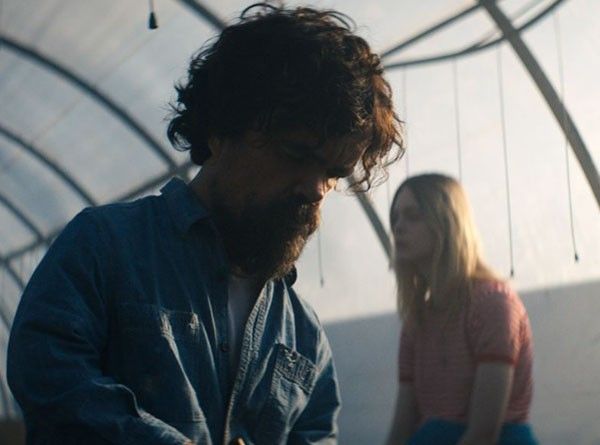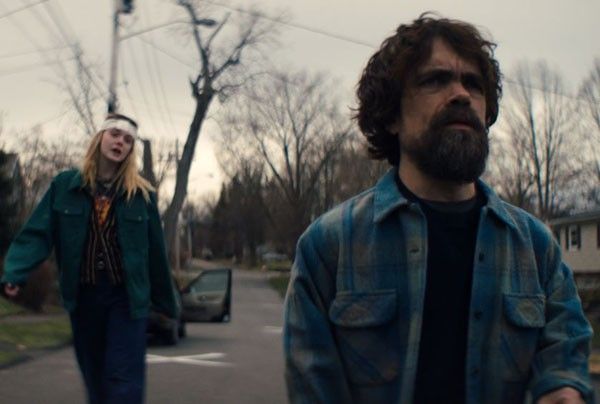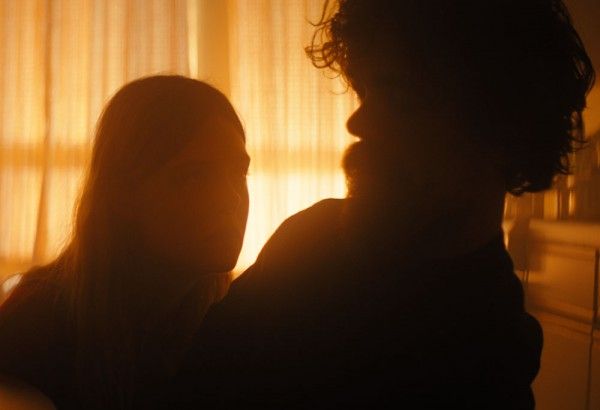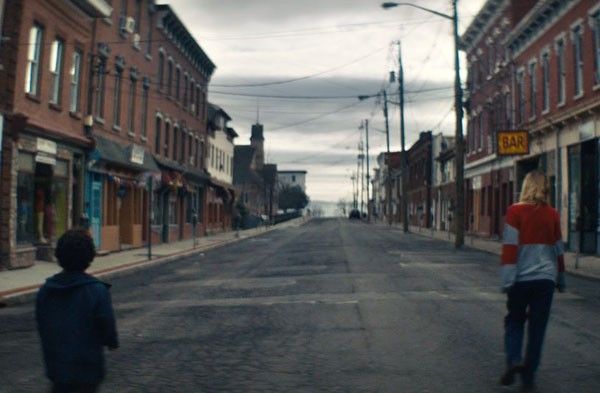From director/cinematographer Reed Morano and screenwriter Mike Makowsky, the indie drama I Think We’re Alone Now follows Del (Peter Dinklage) and the carefully crafted paradise that this last man on earth has created for himself. When the arrival of mysterious interloper Grace (Elle Fanning) threatens the perfectly created and scheduled utopia, in his small and empty town, he begins to question whether her staying would be the worst thing that could happen to him.
During this phone interview with Collider, co-stars Peter Dinklage and Elle Fanning, along with filmmaker Reed Morano, talked about the appeal of telling such a stark story, what stood out about the characters, exploring the effects of the apocalypse without showing the apocalypse, feeling lonely vs. being alone, and their most memorable moments together, during the shoot. Morano also talked about her next film, The Rhythm Section, and why it’s not your typical action movie, while Dinklage talked about when he learned how Tyrion’s journey would conclude on Game of Thrones, and Fanning shared what fans can expect from Maleficent 2, and getting to do her own singing for Teen Spirit.
Collider: I really enjoyed this because it’s so different than anything that I’ve seen, which I can very much appreciate. Reed, you said that you were looking for something weird, when this script came your way, so what did you see in I Think We’re Alone Now that would fit your definition and aesthetic for weird?
REED MORANO: Peter Dinklage was already attached to it. Actually, what I really gravitated to was that it never took a turn. What I loved was that it didn’t try to explain anything. I really appreciate when there’s restraint in a script. There’s often not a restraint in scripts. They feel like they have to explain everything and they have exposition, all the time, and that’s my nightmare. It made me more curious and more hungry to know the world, but also, as filmmaker, it’s enticing because there are so many things that are unexplained and that are open, that it gave me more of a job to do.
This is a pretty stark story without a ton of dialogue. Peter, was that something that appealed to you about it? What then also made you want to take things a step further and sign on as a producer, as well?
PETER DINKLAGE: Well, I love not having to learn dialogue. No, it was a really lovely script. I got a hold of it somehow, and I’d been looking for things to help put together, in the early days. Sometimes, as an actor, especially when you get older, you’re just coming into the ninth inning and you’re doing your part of the job, but I love being a part of things from the ground up. Having been doing this for awhile, I know a lot of people who are good at it, and I can call upon them, but this one was one of those rare occasions where I’d never worked or met Reed [Morano] before. I knew of her film Meadowland, which I really love, and I just had a real strong visual sense that she’d be perfect for this material because, as you said, it is a world with very little dialogue. You need somebody who has a beautiful visual aesthetic, and that’s what Reed excels at. Then I met with her, and we got along very well. Everything else fell into place. I had worked with Elle [Fanning] before, and Reed and I both thought she would be perfect for this part.
Elle, what was it that spoke to you about this character?
ELLE FANNING: For me, a big part of it was that I knew Peter and Reed were already attached. I knew Peter. We did two scenes in another film. This set was the most joyous, funny set, ever, even though there’s definitely a serious mood in the movie. It was just so, so, so much fun. Also, with the character of Grace, I was just so intrigued by the possibilities of what she could be. Reed and I were really excited to explore that, and to explore the side of myself which is really silly. I’m a very wacky person, which I don’t think I get to show as much, so I actually feel like Grace is the most similar character to my real personality that I’ve ever played before. I loved getting to explore that. Also, there was the idea of the apocalypse and shaking up that genre because people think about zombies and superheroes and action fighting, but that’s not what our movie is. It doesn’t have to be explained. It’s about this relationship between two people. The best movies are about two people. So, that’s what drew me to it. When I was young, I was very terrified by the apocalypse happening. Subconsciously, we’re all very scared of that ‘cause it’s a mystery. People don’t like things that they don’t know.
Even though we never get the answer to what happened to the world prior to when the film picks up, did you guys ever think about or have any conversations about that? Did you each come up with your own version of what this apocalypse was, or did you not even really ever want to get too specific about that?
FANNING: Our characters don’t know what happened, so for me, it wasn’t important.
MORANO: You’ve just gotta let people know, early on in the movie, that that’s not really the goal of the movie. In the world we live in today, you have to know everything. People think, “Oh, I can look anything up on the internet and find the answer to anything. It’s on Wikipedia, so of course, it’s definitely gonna be accurate. In a movie, every question must be answered.” Well, no, I don’t actually believe in that. I don’t like when a movie answers every question ‘cause I like to actually use my imagination. I would like to encourage people to use their imagination. There is a beauty sometimes in leaving something unanswered. In life, there are many questions that we’ll never be able to answer, so I like when a movie reflects that reality. What would you do? What becomes the real issue in a story, when it’s not all about, “Let’s solve the apocalypse and find out why it happened”? Anyway, there’s a really loud noise at the top of the movie, and that was the apocalypse, so you can hear it and think about what that might be.
It seems pretty rare that an actor has this many scenes in one film where they’re alone. Peter, what was that like for you, especially when it came to working with Reed? And Reed, how was that for you, as the director and the DP, when you only had one actor that you were collaborating with?
MORANO: That was another thing that was so awesome about working on this movie. I loved the idea of really getting to know one to two actors. Grace was probably not as fleshed out, in the early drafts of the script. I did the same thing with Meadowland, where the husband wasn’t really fleshed out. But with a two-hander, it’s also more interesting, when you get to know the first character better. I always love watching movies with ensemble casts, but there is something so great about just attaching the audience to this one person, or these two people, and allowing them to go into that person’s perspective and feel their feelings. It’s a big opportunity, for me, and a joyful thing to be able to let an actor show the world all the shades of the rainbow of this character through their skills. I choose from what they give me, and they gave me all the right stuff. I love human behavior, and it’s a great way to study human behavior.
DINKLAGE: Working with just one other actor quite possibly could have been hell. But it wasn’t hell, it was Elle. Elle is heaven. Having worked with her before, you also wanna work with somebody that you have a good relationship with and can have fun with. This movie is so intimate and small, and there were very few people in the cast and crew, so we needed the right people on board. Reed had worked with much of the crew before and had a great experience with them.
MORANO: And when I don’t like someone, I kick them off set.
It seems like this is a guy who is much more at home with being alone than most people would be. Do you think that, at any point, he had a moment of freaking out before we met him, or is this just who he is?
DINKLAGE: No, I don’t think he did. Maybe he got a little bit freaked out by what he had to do and the mess he had to clean up. He was asleep, he woke up, and everyone was gone. I don’t think he batted an eyelash. He freaked out later, when she leaves.
FANNING: He freaks out when he realizes that he thought he knew himself.
DINKLAGE: I didn’t play it like a freak out, so let’s be clear about that.
MORANO: He totally bugs out when he realizes that he actually needs a person. He wasn’t really expecting that.
It’s interesting because the film explores the difference between being alone and being lonely. It’s so easy to feel lonely, even if you’re in a room full of people, but this guy is really alone and doesn’t seem to feel that lonely.
DINKLAGE: Exactly! We choose to be alone. We don’t choose to be lonely. He doesn’t realize until he meets her, how lonely he is.
Reed and Peter, because you both signed onto this before Elle Fanning was cast, what were you looking for, for the character of Grace?
MORANO: Basically, what we knew was that we needed somebody very, very unique and very special, who could come and bombard you, totally crash your party, and be really forward about what they want, but you would still somehow end up not wanting them to leave. That’s a really particular person. Not many people can do that. So, what we needed was for Grace to be this magical human being, whose excitement, passion, and energy is infectious. No matter how much you want to ignore it, you can’t, and not because it’s annoying, but more because it’s endearing and it becomes comforting to you. It becomes the thing you never knew you needed. That was why we wanted Elle. There was really no discussion. It was pretty much like, “Who do you want?” And we both were like, “Elle. We want Elle Fanning.” I hadn’t worked with Elle before, but I had a feeling about her. I’m not gonna say that I’m psychic, but I often have a feeling about that, and I was right. And my feelings were confirmed by Peter.
(Screenwriter) Mike [Makowsky] would admit that what he wrote was really more where it dealt with the main character, and Del was based on a lot of Mike’s experiences. When I came to the movie, Mike was like, “Look, I think you can really help me flesh out Grace because you’re telling me that you can understand why Grace does the things she does.” And I was like, “Yeah, I can understand most of the things Grace does.” The things that I couldn’t justify, we changed. And then, when I met with Elle, it was really important to her that the character became as three-dimensional as possible. So, with Mike’s blessing, we ran with that. I could justify certain things that Grace did, but Elle had to really be able to understand it and come up with her own reasons. I just created a scenario where Elle could embody Grace, and she would become something much larger than life, with a lot more layers of depth than maybe we originally thought, on the page.
DINKLAGE: I feel this movie has a really unique love story because it’s a love story between two people who never would have met, if there was a billion other people on the planet, and they never would have been in the same social situation, at all. I love the movie Harold and Maude. And in Lost in Translation, they kiss once and it’s one of the most romantic movies ever made. I think that’s romance. Love is ageless and without boundaries, and I feel like that’s what we have. Anybody else, who would be more my age, would be a little too convenient and you could see it coming. This wasn’t that, which I really love. It calls into question, what is a romance? What’s romantic in films? Everybody has a different opinion of that. You can go from a traditional, beautiful love story like Casablanca to Lost in Translation to this film to Harold and Maude, which is completely unique from the traditional love story of beautiful people batting eyelashes at each other.
MORANO: It’s also not about judging other people, and who should be with who. In the end, people are just people. Maybe that message goes beyond a love story. We can all co-exist and, in fact, once everything else is gone and nothing else matters, all you have is the person next to you.
Reed, it sounds like The Rhythm Section is a bigger movie and a very different movie than I Think We’re Alone Now. That film is being described as an action thriller, but what can you say about the tone of it, and what are you most excited about, with what you were able to do with that film?
MORANO: I’ll just say that I do think the movie is a totally different experience. When I was on it, there were moments where I wanted to click my heels and be like, “There’s no place like home,” meaning Haverstraw, where we shot I Think We’re Alone Now. But all experiences make you appreciate the other experience.
DINKLAGE: Then, you got to spend more money, and you’re like, “Eh, nevermind.”
MORANO: No, but it’s all the same problems. I will say that referring to it as an action movie, what I’m gonna give you, as long as I get to follow it through, is not your typical action movie. The hoodies that we made for the crew had in quotes, “It’s an action movie.” It’s a different thing. It was weird because I was editing I Think We’re Alone Now while I was prepping The Rhythm Section, so those two movies intertwined in a really weird way, but they couldn’t be more different. One is a little more commercial. I Think We’re Alone Now is a situation where I was allowed to do whatever I wanted, and that was awesome. I wanna do more of those.
Peter, you’re on one of the biggest TV series, ever, with Game of Thrones, which is going into its last season. How long ago did David Benioff and Dan Weiss tell you how Tyrion’s story would end? Did you just find out this season, or have you known that for awhile?
DINKLAGE: Just like you, I knew nothing. You will know nothing right now. That’s a line from the show. You know nothing. I have sniper red laser things all over me, whenever I say Game of Thrones. Nobody ever knows, until you get the scripts for the season, every season.
Elle, fans of Maleficent have been waiting for the sequel for awhile now. How will the sequel differ from the first movie?
FANNING: Oh, god, you’re asking us about all of the secretive stuff. I’ve never done a sequel before, for a film. When I did the first movie, I was 14 years old. It came out when I was 16, but I filmed it when I was 14. Now, I’m 20, so the character has obviously grown up a lot. I’ve never returned to a character before, so that was really exciting, and we have an amazing cast, this time. We have new cast members, like Michelle Pfeiffer and Chiwetel [Ejiofor].
DINKLAGE: He’s one of my favorite actors.
FANNING: He’s amazing! I’m excited about it. We just finished. It took awhile, but we just finished and it was really cool to return to that character.
You also just had Teen Spirit at the Toronto Film Festival (TIFF). What was it like to get to play a character where you could also do all of your own singing?
FANNING: That was very exciting! I sang when I was younger, but it was more of a hidden thing that I did. I was in the choir at school and I got a solo once, but I’ve never really, truly been able to sing. I sang them all live, and I sang five songs. It was hard work, with the prep, but, you can actually feel and hear the growth in your voice, and that was so rewarding. I think everyone should do it. Even if you sing badly, everyone should go up on stage and do it ‘cause the feeling is incredible. We had real crowds. I was very nervous to premiere there. People have seen my acting, but I’ve never sung in a film before, so I was nervous for people to hear it.
Did you have a favorite song that you got to perform?
FANNING: The last song that I sing was the most fun to perform. I like singing “Little Bird,” the Annie Lennox song, a lot. That one was cool.
Reed, as someone who has been a DP, how do you approach working and collaborating with a DP, when you’re the director?
MORANO: I was the DP on I Think We’re Alone Now, but on The Rhythm Section, I worked with Sean Bobbitt, and on The Handmaid’s Tale, I worked with Colin Watkinson. I know how a DP wants to be treated, and I know what they wanna be told and not told. I have a level of sensitivity and a bedside manner, which is what helps me with actors, but I also use it on DPs. I’m not gonna come in and take over. I’m not obsessed with that. I just think about other people a lot. I think about how I can get the best out of other people, or whatever I need out of other people, in a way where they feel good about it. Collaboration is a great joy for me because I get to work with my idols, who are these other DPs.
Is there a director, living or dead, that you would have wanted to be a DP for because you really loved or admired their filmmaking style and aesthetic?
MORANO: [Stanley] Kubrick. I just like the atmosphere that he created. To that end, I would also love to have worked with [Alfred] Hitchcock because he’s a master of tension. The most exciting thing to do is to never take any scene at face value. Even if it doesn’t define the tension, it’s about the groundwork you lay on set, and a lot of that is the choices you make in the edit and not taking any scene at face value. You have to use all of the tools that you have at your disposal to create that tension, and the original master of tension was Hitchcock. I think Kubrick did that, too.
Peter, you also have My Dinner with Hervé, and I’m always so fascinated anytime an actor takes on a real person. What did you learn about Hervé Villechaize, through the process of doing that, that most surprised you, or maybe changed how you felt about him?
DINKLAGE: It was the first time that I had ever played somebody who really existed, and that was hard. I spent a lot of time with his brother, who obviously was very close to him, and his girlfriend Kathy. I feel like that gives you a certain depth, but at the end of the day, you can never be that person. You’re just doing your acting version of specific times in his life. He was a great man. The more I learned about him, the more I loved him, which isn’t always the case for people. Sometimes, the more you learn about somebody, the less you like them. Your heroes can disappoint you. But Hervé led a very interesting life.
You guys clearly enjoyed working together, and you also seem to genuinely enjoy each other’s company. What was the most memorable moment, making this project together?
FANNING: We ate mozzarella sticks every lunch.
DINKLAGE: I liked that, too. Nobody else had the guts.
FANNING: Every single lunch, in all, we were trying to figure out which one had the best, in all of the towns in upstate New York.
DINKLAGE: There should be a Zagat’s guide for mozzarella sticks.
MORANO: We have a text chain going, with the three of us, that has been going since before we started shooting.
DINKLAGE: Charlie Rose once asked a question of Steven Soderbergh, when they were talking about the Oceans movie because it seemed like they had a really good time making that movie. He asked, “Is that any reflection on quality of the film? Do you think having a great time shooting a movie means the movie will be great?” With all love and respect to the late, great Burt Reynolds, he said, “Well, that would mean Cannonball Run would be the best movie ever made.” Sometimes that’s true, but that’s not always the case. You can have a great experience and the film you end up making isn’t the greatest, but you had a good time. The older you get, the experience of making a film is sometimes more important than the end result. But on that rare occasion, you have both, and that’s what this was. It was one of the greatest experiences of my life, on any movie, and I am so proud of this film, and of working with Reed and Elle. When those two things happen, there’s nothing better.
I Think We’re Alone Now is in theaters in Los Angeles and New York City, and opens nationwide on September 21st.

